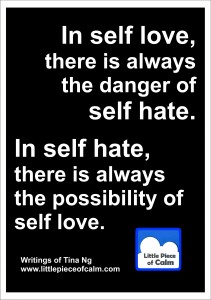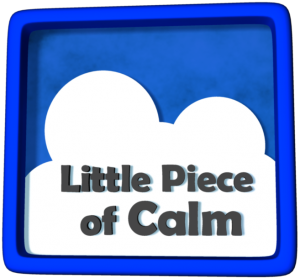 There is a common misconception that self-love and self-hate are mutually exclusive, and that they are polar opposites of a spectrum. Lately, I’ve been investigating into the correlation between the two. What I’ve found (and I know this may not apply to everyone) is that within one, there is the shadow of the other.
There is a common misconception that self-love and self-hate are mutually exclusive, and that they are polar opposites of a spectrum. Lately, I’ve been investigating into the correlation between the two. What I’ve found (and I know this may not apply to everyone) is that within one, there is the shadow of the other.
When I speak of self-love, I’m not talking about self confidence or a healthy self-esteem. I’m talking about those times when we inflate our ego or self-image, wrap it in bubble wrap and get all defensive when other people or circumstances seek to burst our bubble by undermining the unrealistic ideal we have created for ourselves. This kind of self-love may be full of self-centredness, self-importance, attention-seeking, pretension, perfectionism, and even arrogance. This self-love cries out, “Me, me, me!” all the time, and starts every sentence with “I…”
Self-hate describes those times when the ego is deflated, the bubble has burst and it looks like it’s never going to come back. It’s those times when we punish ourselves with guilt, blame, anger, mistrust, pessimism and negativity. It’s the cloud that hangs over the head of someone who’s depressed. The sound of self-hate in someone’s head takes the form of put downs, “I’m never going to be good enough” and “I made a fool out of myself.”
Looking at these descriptions, it seems like self-love and self-hate are so different they can’t possibly be linked. Yet when you look deeper into each of them, you realise they both stem from the same place and share the same qualities. The commonality is so obvious sometimes it’s missed. That commonality is the “self”. The self is obvious in self-love where the ego is grasping onto everything that uplifts it. Yet the self is also dominant in self-hate, because when someone is lost in self-hate, they are consumed in their own preoccupations and misery. The attachment to the self – wanting it and not wanting it – is featured in both self-love and self-hate, respectively.
Another fundamental commonality between the two is our lack of understanding of ourselves, and more specifically, our true self. With self-love, we have an inflated ideal of ourselves; with self-hate we have a deflated view of ourselves. In actual fact, we are neither. As imperfect human beings, we are a mixture of good traits and flaws. Sometimes we are kind, generous and loving people. Sometimes we are angry, inconsiderate and nasty pieces of work. Those wrapped in self-love only see the former, and for those in the self-hate camp will only tend to see the latter. The reality is often somewhere in between, without judgment, and always in continuous flux.
When you investigate into your own mind, you may come to see that in self-love there is actually an insecure acceptance of yourself. You accept yourself, but only when things are going right. After all, it is hard work to continuously maintain an idealistic and perfect image of ourselves. When we say or do something that does not accord with our expectations of ourselves, we either turn a blind eye to it or we try even harder to maintain that tenuous ideal we have set up for ourselves.
This insecurity is also a pivotal driving force of self-hate. Again, there is a lack of acceptance and appreciation for ourselves. When you do something that is negative, this simply confirms the negative view you hold of yourself. When you do something positive, you may dismiss it as insignificant. A good test of whether you fall in this category is a reflection on how you accept compliments, if you can at all.
Whether self-love or self-hate, we are plagued with an attachment to the self. This attachment becomes the never-ending source of unhappiness for us. This is because we will always be susceptible to the whims of praise and blame. Self-lovers grasp onto praise as it feeds their ego, bur overreact when met with blame; self-haters grasp onto blame as affirming their self-view, and often are ambivalent or even distrusting of any praise that they receive.
The point of this article and my investigation into the correlation into the two isn’t for intellectual amusement. I hope this article highlights the need to recognise the two extremes are not extremes at all, but rather interrelated and stemming from the same attachment of the self. I also hope to share the message that if you swing from self-love to self-hate and back again, this is nothing unusual and not the onset of bipolar or something. Rather, as both are so intertwined and in continuous change as it reacts to whatever is happening in our lives, the swinging you feel is but a movement of the mind. In time, as you watch the swinging without reacting to it, without feeding it or pushing it even further one way or the other, the swinging will eventually come to a stop on its own.
As the mind becomes still and quiet, you can use this calm mind to look deeper into yourself. See for yourself who ‘you’ really are, without being caught up in the chatter of the self-lover or self-hater. In time, I hope you will find that there is another form of love that is not even on the spectrum between self-love and self-hate. That form of love is an unconditional love, one that is all-embracing, all-understanding, and that which loves without reference to the self.
So the exercise for this week is to take notice of the self-talk that happens in your head throughout the day. Believe it or not, every person talks to themselves in the head, some just louder than others. Become familiar with the type of ‘talk’ that goes on in your mind. Don’t react to them (don’t need to talk back to them either!), and try not to get caught up in them either. Just watch/ hear what kind of talk happens in your mind.
Is the talk mainly self-inflation or self-deflation? What often happens that sparks either kind of talk? How do you react to that kind of talk? What if you chose not to react and just let the talk fade to silence? What power does that talk now have on you, if any?
In dropping the self-centredness and attachment that you hold to your ‘self’, open yourself up to the possibility of love that is unconditional, boundless, non-discriminatory, and pure. Love that is the same for yourself, and the same for those around you.

 Posts RSS
Posts RSS


Great post!
I’ve been thinking about the paradox of self hate and self love for the last few days and have reached the conclusion that they often fuel each other. If someone has a great deal of unhealthy self love without knowledge of self (pride) that person will never be able to live up to their own expectations and will feel hatred, discontent and at least a mild desire to be reckless or self destructive.
I’ve especially been thinking about this in relation to dysfunctional families in which a lack of trust in others and firm self dependence is taught generation after generation. If we rely on ourselves too much and cannot admit that we can’t do everything ourselves, that can lead to self hatred when we know that we are isolated and wish we were not but feel powerless to change. I wouldn’t have thought that this form of self hatred was also a form of self love, but it is a refusal to take a chance by trusting others. Taking that chance is a sacrifice and love shows itself through our sacrifices. So these dysfunctional people show a lack of love for everyone but themselves, it seems.
With or without dysfunction, it seems that one of the best ways to overcome a propensity for self hatred is by learning to be humble so that we are detached from our concern for self-image and are able to acknowledge our faults. A genuine interest in the well-being of others without a desire to control them would help to lead to the necessary detachment, too, I think.